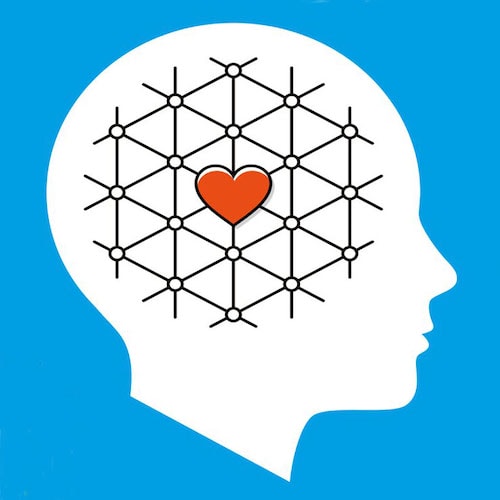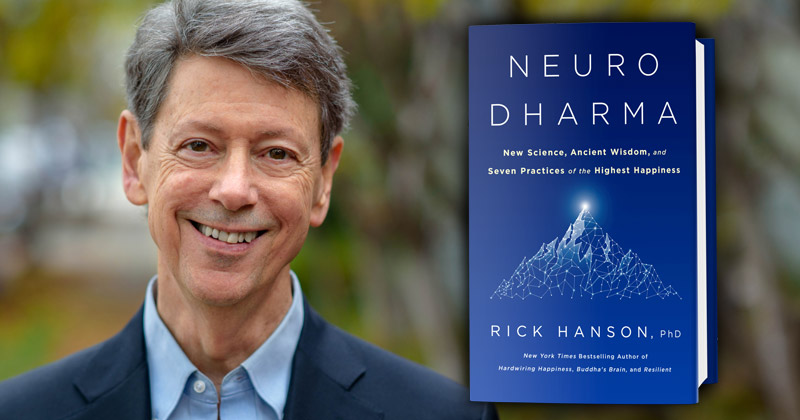
Dr. Rick Hanson visits Sharon to explore resiliency, lasting traits, and the intersection of neuroscience and spirituality.
In this episode of the Metta Hour, Sharon is joined by Dr. Rick Hanson, the author of the new book Neurodharma. In this joyful and bright conversation, these two teachers uncover and elucidate core themes from the book, sharing anecdotal experiences to bring to life concepts and lessons which are both timely and insightful. Would you like to find out how to reach your highest happiness, foster resiliency in difficult situations, and create lasting positive traits in your life? Dr. Hanson has you covered with his fresh and contemplative approach to bridging together the worlds of neuroscience and spiritual tradition.
Rick Hanson, Ph.D., is a psychologist, senior fellow of UC Berkeley’s Greater Good Science Center, and New York Times best-selling author. Founder of the Wellspring Institute for Neuroscience and Contemplative Wisdom, he’s lectured at NASA, Google, Oxford, and Harvard, and taught in meditation centers worldwide. Learn more about Dr. Rick Hanson, his available courses, and his podcast, Being Well, at rickhanson.net.
Get a download of the first chapter of Rick’s newest book, Neurodharma, as well as 3 free audio meditations recorded by Rick: Bonus Content
Seven Practices of the Highest Happiness
Dr. Hanson explores the topics and themes behind his new book, Neurodharma. What is happening physically when we abide in the qualities of compassion and loving-kindness? Informed by the growing understanding of what’s happening in the body when a person is rested in cultivated traits of compassion, kindness, and love, how can we use that understanding to develop and foster these qualities within ourselves?
“I see in people who are really far along in practice, the perfection of these seven qualities: Steadiness, lovingness, fullness, wholeness, now-ness, all-ness, and timelessness. The book is about how we can use what we are learning about what is happening in the brain when we are rested, to stimulate the underlying neurocircuitry and thereby strengthen it over time, so increasingly we become steady, loving, equanimous, and so forth.” – Dr. Rick Hanson
Would you like to be part of the next generation of mindfulness meditation instructors? If so, we invite you to take a unique opportunity to study with Jack Kornfield and Tara Brach and become a certified instructor to guide others in their practice – The Mindfulness Meditation Teacher Certification Program: A Two-Year Training Program for Teaching Awareness and Compassion-Based Practices
The Essence of Resiliency (9:05)
Using an example of resilience in his own life, Dr. Hanson shares a story about his recently passed father. His father suffered strokes and other health problems in the final months of his life. This, coinciding with issues pertaining to the medical system, as well as the inherent complications of losing one’s last parent, created a situation that was very difficult to deal with for Dr. Hanson. On his rides home from the hospital he would debrief with his wife, and in doing so, an imaginal meditation came to him as a practice for resiliency.
“I started to feel and imagine myself as being like kelp on the surface of the sea; these long plants, very fluid, very flexible, through which waves would pass. The kelp would be agitated by it, and yet the waves would pass through and the kelp would remain. More and more I tried to imagine my mind in that way, and feel my being in that way; as kelp, very receptively open, no resistance because if you resist you get overwhelmed. You don’t identify with the wave. You let it flow through you, and there you remain. To me, that’s the essence of resiliency.” – Dr. Rick Hanson
For methods and resources for strengthening resilience, dive into Ep. 106 of The Indie Spiritualist
Passing States and Lasting Traits (17:33)
Whatever it is we want to grow inside ourselves; resiliency, love, gratitude, wisdom, can be cultivated through a simple two-stage process. Firstly, we need to experience what we want to cultivate. We must fully experience the state of mindfulness, letting go, patience, or whatever the desired trait may be. Secondly, we need to help that experience sink in, otherwise, it’s another passing state, but does not become a lasting trait.
“Experiencing does not equal learning. That’s the dirty little secret of psychotherapy, coaching, and mindfulness, self-compassion and compassion training. People have an experience while they are doing something, but the emotional residues don’t really land inside, leading literally to an embodied change.” – Dr. Rick Hanson
For scientific insight on altered traits from meditation check out Ep. 122 of Here and Now
Intuitive Empathy (38:02)
The part of the brain that is involved in interoception, which is the sense of the internal state of one’s body, can build up and strengthen good neural tissue through practices like mindfulness. As people increase their interoceptive awareness, they become more capable of being empathic towards others, so in essence, tuning into the internal state of your own being can help one better understand others.
“As we develop the capacity to tune into our internal body sensations, and tune into our gut-feelings and the somatic aspects of the them, we actually develop the capacity to be empathic for the feelings of others.” – Dr. Rick Hanson




